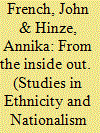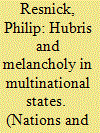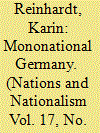| Srl | Item |
| 1 |
ID:
104114


|
|
|
|
|
| Publication |
2011.
|
| Summary/Abstract |
This article deals with the connection between nationality and democracy and explores the role Switzerland plays in the scholarly debate on this question. It identifies three main theses - liberal-nationalist, liberal-multinationalist and liberal-postnationalist - and shows that each of them uses the Swiss case to claim empirical support. It then analyses the connections between nationality and democracy in Switzerland and demonstrates that the country is neither multinational nor postnational, but is best characterised as a mononational state. These findings expose the fallacy of using Switzerland to claim support for either the multinational or the postnational thesis and call for a reconsideration of them. Additionally, they show that "civic nationalism" and "civic republicanism" can be conflated and that a predominantly civic nation is viable and sustainable and is not necessarily an ethnic nation in disguise. The Swiss case thus provides qualified empirical support for the liberal-nationalist thesis.
|
|
|
|
|
|
|
|
|
|
|
|
|
|
|
|
| 2 |
ID:
101983


|
|
|
|
|
| Publication |
2010.
|
| Summary/Abstract |
Since the fall of communism, democracy has come to be seen as the 'only game in town'- the only legitimate form of political system. Democracy is considered legitimate because it provides for individual rights and allows the people access to the resources of the state. If 'we the people' defines the limits of these entitlements, the next logical question is who are 'the people'? In contemporary developed states, the problem of diversity is most often framed as a problem of immigration; the arrival of new groups threatens both the presumed homogeneity of established nations and their democracy. We argue for a new conception of democracy, which takes into account the constructed nature of 'the people' that democracy empowers. This paper attempts to provide such an account by advocating a new understanding of the relationship between nationalism, citizenship, and democracy.
|
|
|
|
|
|
|
|
|
|
|
|
|
|
|
|
| 3 |
ID:
084905


|
|
|
|
|
| Publication |
2008.
|
| Summary/Abstract |
The article sets out to explore the rather different roles that hubris and melancholy can play in the relations between majority and minority nationalities within multinational states. In the case of majority-type nationalities, there is a sense of being a Staatsvolk, a feeling reinforced by linguistic, cultural, geographical, and political characteristics associated with the larger nation-state. There may also be a sense of pride caught up with the larger identity between the nation-state and the empire with which it is associated. For their part, minority-type nationalities have been more prone to express their national sentiment in melancholic terms. Hence a tendency to dwell on lost battles of the past, on suppressed rebellions, on recurrent threats of assimilation and linguistic extinction. There may be elements both of hubris and of melancholy to national sentiment in multinational states, and the dialectic between the two colours their overall political development.
|
|
|
|
|
|
|
|
|
|
|
|
|
|
|
|
| 4 |
ID:
107274


|
|
|
|
|
| Publication |
2011.
|
| Summary/Abstract |
This article presents a critique of Will Kymlicka's theory of multiculturalism. It examines Kymlicka's theoretical distinction between mononational and multinational states and his empirical examples that support this theory: Germany as an example of a mononational state and Switzerland as an example of a multinational state. By means of a content analysis of constitutions, it demonstrates that Danes and Sorbs should be characterised as national minorities in Germany, whereas the French- and Italian-speaking communities of Switzerland do not constitute nations. The distinction between mono- and multinational states proposed by Kymlicka does not hold for Germany and Switzerland, and hence must be approached anew, theoretically as well as empirically.
|
|
|
|
|
|
|
|
|
|
|
|
|
|
|
|